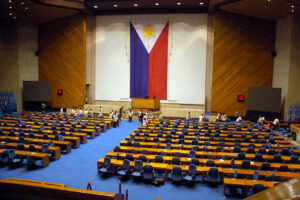By Kenneth Christiane L. Basilio, Reporter
THE HOUSE of Representatives may have violated a Philippine Constitution provision disallowing amendments on bills passed on final reading, analysts said, which could open the chamber to potential lawsuits that could derail the government’s spending plan next year.
The chamber approved House Bill (HB) No. 10800, the General Appropriations Bill, on final reading last week. It contains the proposed P6.352-trillion national budget for next year.
The House adopted committee amendments to the spending plan during plenary deliberations while deferring proposed individual reallocations to a later date to meet its self-imposed September deadline.
“The House can’t. There is no precedent to allow this unconstitutional and illegal act,” Michael Henry Ll. Yusingco, a constitutionalist and senior research fellow at the Ateneo Policy Center, said in a Facebook Messenger chat, referring to the House’s creation of a “small committee” tasked to approve and resolve individual amendments to the chamber-approved national budget.
“The House transgression can be challenged in the [Supreme Court],” he added, noting the Senate could still correct the chamber’s “foul play” on the proposed budget, making it valid.
The 1987 Philippine Constitution states that “no amendment… shall be allowed” after a measure’s last reading, according to Sec. 26 of the charter.
“It can be challenged before the Supreme Court for being constitutionally infirmed, since this is an indication that Congress exceeded the exercise of its constitutional mandate,” Ephraim B. Cortez, president of National Union of Peoples’ Lawyers, said in a Viber message.
The chamber created a small committee to resolve individual amendments to the General Appropriations Bill on second reading, a move meant to expedite the budget bill’s confirmation. The committee received proposed changes to the measure from congressmen until last week Friday, two days after its third reading approval.
“It should receive and resolve individual amendments approved during the plenary debate on second reading. If it inserts amendments not approved during the second and third readings, that is illegal and unconstitutional,” Mr. Cortez said.
“The small committee cannot exercise an authority that the plenary cannot exercise as well. It was already passed on third reading, it can no longer be amended,” he added.
The office of Party-list Rep. Elizaldy S. Co, who heads the House appropriations committee, did not immediately respond to a Viber message seeking comment.
Lawmakers during the budget bill’s plenary debates signaled their intention to increase funding to certain government agencies without specifying how much should be augmented.
The move by congressmen to tackle proposed reallocations in a committee instead of the plenary “undermines the transparency of the budget process,” Mr. Yusingco said, noting it to be a violation of public trust.
The House also fast-tracked the budget’s approval with blessing from President Ferdinand R. Marcos, Jr. after he certified as urgent the proposed spending plan, allowing the chamber to do away with the constitutionally prescribed three-day interval for second and third reading approval of bills.
The government certifies as urgent the budget bill yearly “as a matter of practice,” said Mr. Cortez.
“There is a sense of urgency, of course, but this is not the kind contemplated by the Constitution to warrant the skipping of the three-day reading requirement,” Mr. Yusingco said.
The President has the ability to certify as urgent the approval of certain measures “to meet a public calamity or emergency,” Sec. 26 of the Constitution read.
